Zhu Jianshen - the Chenghua Emperor

Zhu Jianshen is united with his son
A Troubled Upbringing

Zhu Jianshen, the eldest son of the Zhengtong Emperor aka. the Tianshun Emperor, did not exactly have an easy childhood. First he was Heir Apparent, then just three years old he was imprisoned in the imperial palace; then again he became Heir Apparent before age 10. Finally in 1464 at the age of 16 he was enthroned as the eighth Ming emperor with a reign title of Chenghua ("accomplished change").
He was a mild-mannered person, fond of the arts and himself a good calligrapher. But his difficult upbringing left its mark; he became rather indecisive and was prone to stuttering. He died at the age of 40 after ruling for 22 years.
The Reign of The 12
The empire was however fortunate by being in capable hands in his early years. A council of 12 regents set out to amend the wounds of Zhu Jianshen's father's waging war, leaving suffering peasants to fend for themselves and, later, purging over 1.5 million alleged opponents and their families.
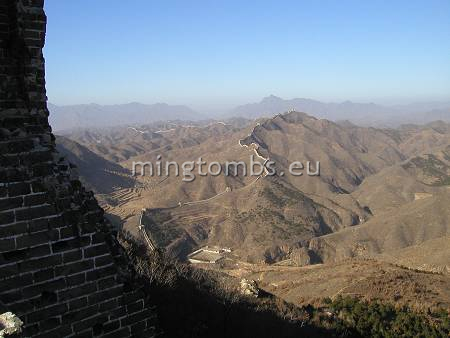
The Great Wall at Simatai
The council rehabilitated those that had been unjustly punished and provided ample relief to draught stricken areas. The military was completely reorganized and celebrated successful campaigns against the Mongols and the Jürchen people from Manchuria.
The Great Wall in the north was rebuilt and reinforced and by 1479 it defended the empire for a length of well over 5,000 kilometers (photos).
A Wicked Nurse
But all was not well back in the palace.
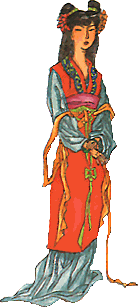
Zhu Jianshen never became comfortable around women. His former nurse and now principal concubine, Wan Guifei, had given birth to a son who died early. She took out her sorrow on all the other imperial concubines by arranging the death of their offspring.
Along with her favorite eunuch, Liang Fang, and aided by the evil eunuch and chief of police, Wang Zhi, Wan Guifei also set out to plunder the empire. They amassed enormous wealth and sold titles to other officials so that they in turn could also enrich themselves at the expense of the common people.
All this took place with the emperor's silent consent. He was unable to muster the necessary authority to put an end to this massive embezzlement, which gradually led to a decline in prosperity and growth.
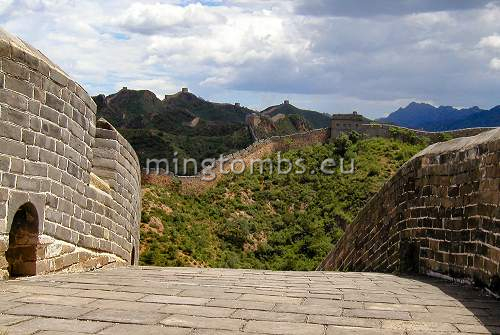
The Great Wall at Jinshanling
Peasant uprisings became more frequent as a result of the exploitation and the Ming gradually began to rely upon military power to rule the country.
A Lost Son
When one of Zhu Jianshen's concubines, surnamed Ji, became pregnant the first empress hid her and managed to conceal the birth of what was to become a future Ming emperor.
The boy was entrusted to the palace gatekeeper and when the heir was five years old, he was brought in front of Zhu Jianshen, who was moved and happy to have an heir.
Concubine Wan Guifei however took a gruesome revenge by immediately having the gatekeeper and the young heir's mother, concubine Ji, murdered.
Concubine Ji was later rehabilitated. When her son ascended the throne he gave her the posthumous title of Empress Ji and had her reburied with the rank of an Imperial Empress in Maoling, the tomb of his father, The Chenghua Emperor. She still rests with him there today.

Maoling layout
Maoling was crafted after Yuling, the tomb of Chenghua's father.
It is merely equipped with the basic structures of a Ming tomb; a front gate, a sacrificial hall, a burial area with sacrificial stone vessels and the memorial tower on the "Square City".
The mausoleum is dilapidated except for the surrounding wall, which has been repaired several times since its construction in 1487.
The mausoleum is closed to the general public.
Tomb location:

Google Earth:

Maoling - the Fifth Tomb, Right?

Ruins of Memorial Tower
Indeed! Zhu Jianshen was interred in Maoling, the fifth mausoleum in the imperial Ming burial grounds around Mt. Tianshou north west of Beijing.
Construction of Maoling began in September of 1487 after the death of Zhu Jianshen and was completed in about seven months.
The entire tomb covers an area of 256,000 square meters and is located at the foot of Mt. Jubao ("treasure-gathering"), a little west of Yuling, his father's mausoleum.
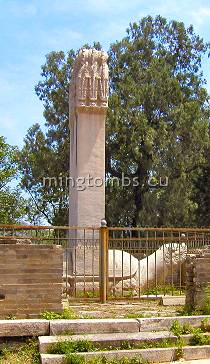
Divine Merit Stele
Ordinary
Maoling is nothing out of the ordinary. It was beautifully decorated when built but the decorations have long disappeared and by now the tomb lies rather dilapidated in need of some tender love and care.
The layout is almost a copy of neighboring Yuling. Following the front divine merit stele, it has a front gate, a sacrificial hall, a wall and gate separating the front and back sections, sacrificial stone vessels, the memorial tower on the "Square City" and, of course, the tomb mound itself.
The front gate was a 3 by 2-room structure with only remnants of the side walls still standing. The surrounding wall however remains intact.

The front gate of Maoling
Parts of the back and side walls of the sacrificial hall are extant as are parts of the dividing wall between the sacrificial section and tomb section of the mausoleum.
The stone vessels and their altar remain in place as does the memorial tower, however in a poor shape. As is the case of Yuling, there is no Ling Xing gate.
Empress for One Month
The Chenghua Emperor is entombed in Maoling along with his three empresses, surnamed Wang (died 1518), Shao (died 1522) and Ji (murdered by concubine Wan Guifei in 1475).
Empress Wang was from Nanjing, Jiangsu Province. She was promoted to empress in 1464. She died in 1518.
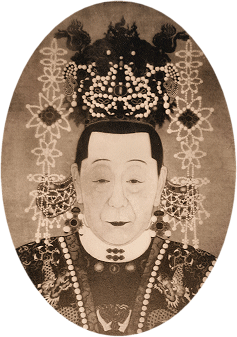
Empress Wang
Empress Dowager Ji was from Hexian County, Guangxi Province and a daughter of a local official from the Yao minority. When pregnant with the later Hongzhi Emperor she was maltreated by the evil concubine Wan. But Lady Ji managed to go through the pregnancy and immediately after giving birth hid the newborn for almost five years.
When her son at the age of five was brought in front of the emperor, Lady Ji was soon murdered by one of Wan's agents in 1475 and laid to rest in Jinshan Hill, west of Beijing. Later, when the Chenghua Emperor learned that Lady Ji was the mother of his son, he bestowed her the title of Imperial Concubine. Even later, when in turn her son ascended the throne, he granted his mother the title of Empress Dowager and had her remains reburied in Maoling.
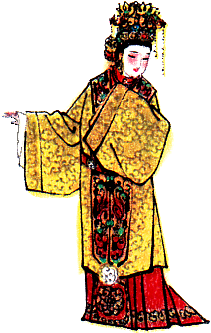
Empress Dowager Shao was born in Lin'an County, Zhejiang Province and was the grandmother of the future Jiajing emperor (r. 1522-1567). Her father had sold her to a eunuch intendant, who later after teaching her Tang poesi presented her to the Chenghua Emperor as a gift.
Lady Shao was promoted first to Imperial Concubine and then highest ranking concubine. Her grandson, the Jiajing Emperor, bestowed her the ultimate promotion to Empress Dowager when he became emperor in 1521. At that time she was an old, blind woman living in the "imperial laundry", a compound south of the Imperial City occupied by retired or disgraced palace women (Cambridge, vol. 7, p.440). She died the same year.
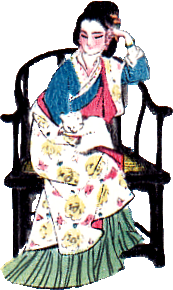
Zhu Jianshen actually had four empresses and not just three. The first, empress Wu, was however dethroned by him after just one month for having the evil concubine Wan Guifei flogged. The emperor had empress Wu disgraced and moved to a far back corner of the Imperial City where she lived out her life for the next 45 years. In a strange twist of fate, she got her revenge against Wan Guifei, since it was Lady Wu who concealed the emperor's son, born by Lady Ji, from the evil Wan for five years.
Zhu Jianshen was infatuated with Wan Guifei and made her his favorite concubine. When he became aware that she was behind the murders of all subsequent heirs to the throne he avoided her, but did not curtail her stranglehold on the imperial palace.
One can wonder how prosperous the empire would have been if the Chenghua Emperor had been as keen as Empress Wu to realize how wicked Wan Guifei really was and would have had the guts to expel her from the palace?